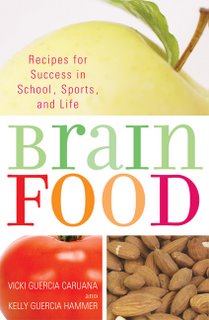
Helping Families Make Wise Food Choices
By Kelly A. Hammer
Overall nutrition is crucial to children's health. Breakfast gets them to lunch, lunch gets them home, and dinner nourishes them overnight. Having a good dinner in the evening isn't enough; kids need to make wise food choices throughout the day!
As parents, we carefully choose for our children many aspects of their lives until they are old enough to make their own choices. We choose the neighborhood in which they live. When they are very young, we help them choose their friends. We monitor how much television they watch and what video games they play. We teach them how to cross streets safely and to wear a helmet when riding a bicycle. We show them how to take care of their bodies by brushing their teeth, washing with soap, and providing remedies when they get hurt. We do all this, yet we sometimes pay little attention to what they eat and why they eat it. How do we get them to eat right?
Lead by Example
Practice what you preach when it comes to nutrition. You are your children's first and most important teacher, even if your children, particularly your preteens and teens, don't always see it that way. If you start your day with a large latte and donut in the car, your children may believe that caffeine and sugar are wise breakfast choices and that eating on the go is normal.
Here are some ways to be mindful of what you eat as a family:
1. Shop for groceries together. Read food labels for nutritional content, and choose foods that are low in sugar and fat.
2. Discuss the school lunch menu with your child in advance to help him or her make wise food choices. Or, if your child takes a lunch from home, have him or her help pack a healthy one.
3. Allow your kids to cook with you, and let them help plan the week's meals.
Slowly introduce some new wholesome foods.
4. Dine together as a family as often as possible. Remember, the car is not the dinner table; refrain from eating there as it encourages eating fast food on the run.
5. Stock your home with low-sugar foods and rid the pantry of refined sugar, i.e., processed white sugar found, for example, in many boxed snacks and cereals.
6. Avoid fast-food restaurants by planning your meals and snacks before leaving home.
7. Be prepared for meal-time changes and food substitutions if necessary.
8. Do not give food as a reward.
Parents should also be aware of their own dieting endeavors and how they affect their children's perception of health. Fad diets, for example, that cut out an entire food group or a substantial amount of calories in order to achieve weight loss are neither balanced nor healthy. When a parent embarks on such a diet, a child is led to believe it is okay to eat only one meal a day or to live entirely on grapefruit! As parents, you need to dispel the myths surrounding the latest fad diet and be an example to your child.
Educate yourself about the nutritional needs of your children. For a visual example of what constitutes a healthy diet, look at the U.S. Department of Agriculture's Food Guide Pyramid. The pyramid is divided into six sections, with a suggested daily amount (number of servings) for each food group. These amounts, however, are much too large for children.
A food guide that takes into account children's nutritional needs would contain a smaller number of servings per day from each food group and a section for treats or extras. See the new food guide pyramid that I developed for children ages 2 to 12. Serving sizes for children also are generally smaller than those for adults. Keep in mind, however, that there are other variables to consider, including individual eating patterns.
Remember, you know your child better than anyone and are capable of providing food choices that are better for their health. The new food pyramid and examples should help guide you and your family toward healthier food choices. As a result, you and your family will achieve a dietary balance that will reward all of you in many ways throughout life!
Kelly A. Hammer is the founder and owner of Hammer Nutrition, which provides education on how nutrition and physical fitness can make for a well-balanced, healthy life. She is also the coauthor with Vicki Caruana of the book Brain Food: Recipes for Success in School, Sports, Life (Rowman & Littlefield, 2007)






No comments:
Post a Comment